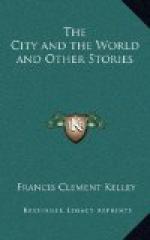“Good-bye, brother, I shall pray for you,” and Father Tom groaned down to his heart of hearts.
Father Ilwin was at the train when Father Tom and his niece arrived home, though quite by accident. Kathleen’s eyes danced when she saw him and she rushed to shake hands. Father Tom said:
“Sure, I had no idea that you knew one another.”
“Yes, indeed, we do,” cried the child. “Why, uncle, it was Father Peter who converted me.”
Father Tom heard, but did not say a word.
It was only three days later when Father Tom stood in the miserable little room that Father Ilwin called his library. On the table still reposed the plans of the new church, but no sound of hammer was heard outside. Father Tom had little to say, but it was to the point. He had profited by his three days at home to think things out. He had arrived at his conclusions, and they were remarkably practical ones.
“Ilwin, me lad, I don’t think I’ve treated ye just as a priest and Christian should—but I thought I was right. I know now that I wasn’t. Ilwin, we can build that church and we will. Here are a thousand dollars as a start to show that I mean it. There’ll be a collection for you in St. Patrick’s next Sunday. After that I intind going about with ye. I think I know where we can get some more.”
Then and there Father Tom Connolly began to be a Saint.
THE UNBROKEN SEAL
The priest ran right into a mob of strikers as he turned the corner of the road leading from the bridge over the shallow, refuse-filled Mud Run, and touched foot to the one filthy, slimy street of the town. He was coming from the camp of the militia, where he had been called to administer the last Sacraments to a lieutenant, whom the strikers had shot down the night before.
Slevski was haranguing the mob and his eye caught that of the priest while he was in the midst of an impassioned period, but a look of hate alone showed that he had seen him. Only a few of the people in the rear of the crowd noticed the priest’s presence at all. He was glad enough of that, for suspicion was in the air and he knew it. Right in his way was Calvalho, who had been one of his trustees and his very best friend when he first came to the parish. It looked now as if he had no longer a friend in all the mud-spattered, bare and coal-grimed town. Calvalho returned his salute with a curt nod. The priest caught a few words of Slevski’s burning appeal to hatred and walked faster, with that peculiar nervous feeling of danger behind him. He quickened his steps even more for it.
“Company—oppressors of the poor—traitors”; even these few words, which followed him, gave the priest the gist of the whole tirade.
The women were in the crowd or hanging about the edges of it. A crash of glass behind him made the priest turn for an instant, and he saw that Maria Allish had flung a stone through the bank window. She had a shawl quite filled with large stones. With the crash came a cheer from the crowd around Slevski, who could see the bank from their position in front of the livery stable.




